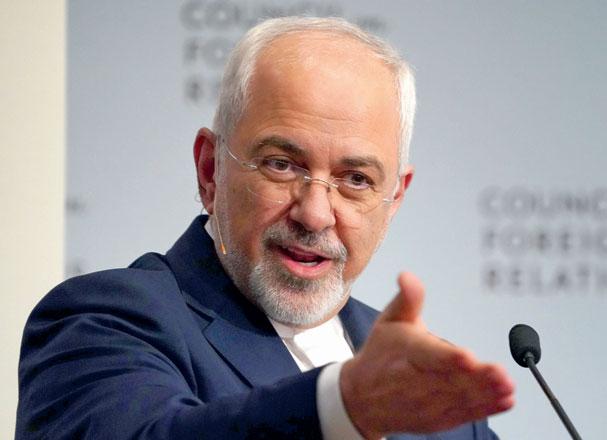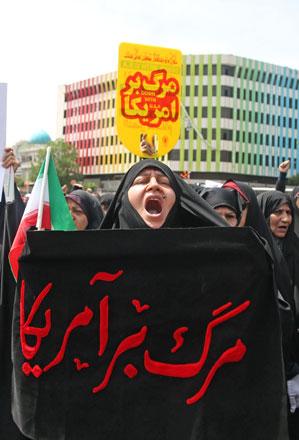You are here
Stay in your job, Iranian president tells ally Zarif
By Reuters - Feb 27,2019 - Last updated at Feb 27,2019
DUBAI/LONDON — Iranian President Hassan Rouhani rejected his foreign minister's resignation as "against national interests" on Wednesday, bolstering a moderate ally who has long been targeted by hardliners in factional struggles over the 2015 nuclear deal with the West.
Foreign Minister Mohammad Javad Zarif, a US-educated veteran diplomat, announced his resignation on Monday in what an aide said was anger at being excluded from meetings that day with Syria's president, who was visiting Tehran.
Two days later, he was back with his position strengthened by the president's endorsement as well as a chorus of support from moderate lawmakers, a senior Revolutionary Guards commander and, implicitly, Supreme Leader Ali Khamenei.
In a letter published by state news agency IRNA, Rouhani told Zarif:
"As the Supreme Leader has described you as a 'trustworthy, brave and religious' person in the forefront of resistance against widespread US pressures, I consider accepting your resignation against national interests and reject it."
Senior Revolutionary Guard Commander Qassem Soleimani said Zarif, who helped craft the pact that curbed Iran’s nuclear programme in return for sanctions relief, was the main person in charge of foreign policy and he was supported by Khamanei.
The support came at a time when the clerical establishment is in a vulnerable position amid growing pressure from the United States, and so in need of promoting unity and keeping the reform wing on its side.
Iranian leaders reached the conclusion that Washington wants regime change after US President Donald Trump withdrew from the nuclear deal in May last year.
In many of his speeches at the time Khamenei stressed that unity is paramount, and that remains his position as Tehran faces reimposed sanctions.
Protests
Discontent with sky-rocketing inflation and unemployment exacerbated by sanctions have triggered waves of protests. Iranians who were hoping the nuclear deal would bring relief are now calling for Rouhani and clerical leaders to step down.
Zarif’s sudden resignation after months of pressure from hardliners was prompted by his indignation of being excluded from meetings in Tehran between top Iranian officials and Syrian President Bashar Assad, an aide said.
Syrian state news agency SANA said on Wednesday that Syrian Foreign Minister Walid Mouallem had received a phone call “from his Iranian counterpart” Zarif to follow up on Assad’s “historic visit” to Tehran.
In another sign Zarif is firmly back in the job, Assad invited Zarif to visit Damascus, state news agency IRNA reported, without specifying a date.
Zarif also spoke on phone with his Pakistani counterpart, Shah Mahmood Qureshi, and offered mediation between India and Pakistan, after rising tensions between the two countries.
“Zarif wanted to resign for a long time and actually he tried several times in the past. But for many reasons, including lack of a replacement, his attempts failed,” said a senior official.
“I believe that is why Zarif decided to go public and resign. It was a cry for help. To tell officials and people that his hands were tied.”
Zarif’s departure would have deprived Iran of its most skilled diplomat, a patient negotiator able to strike a landmark deal with often hostile Western powers.
Hardliners also need him to work with countries such as India and China to find sways to ease the impact of sanctions.
“Zarif is too valuable for the Iranian system to let him go at a time when his diplomatic skills are needed more than ever,” said Ali Vaez, director of the Iran project at Crisis Group.
The foreign minister’s knowledge of the West — gained during years of studying in the United States and then representing Iran at the United Nations — helped him build a rapport with American officials despite decades of animosity between Washington and Tehran.
But after Trump abandoned the nuclear deal and reimposed US sanctions, he came under heavy criticism from opponents who accused him of selling out his country.
Political ammunition
It was unclear whether Zarif’s resignation announcement, and the expressions of support which followed, were orchestrated. But allies said the last two days’ events would give him political ammunition against hardliners.
“There is no one to replace Zarif as the foreign minister. And the establishment knows that,” said Zarif’s ally, speaking on condition of anonymity.
“The establishment needs Zarif and Zarif needs the establishment’s support. And the reactions after his announcement, showed the consensus over the importance of having him as Iran’s foreign minister,” the ally added.
Khamenei, who stays out of day to day politics, has not publicly commented on Zarif’s resignation. But it is almost certain that Rouhani would have needed a green light from the man with ultimate authority in Iran.
Zarif’s move thrust the schism between Iran’s hardliners and moderates into the open, effectively challenging Khamenei to pick a side.
Zarif gave no specific reasons for his resignation. But allies said he had quit after coming under increasing pressure over the nuclear deal and other issues.
On Wednesday, Zarif thanked Iranians for their support. “As a modest servant I have never had any concern but elevating the foreign policy and the status of the foreign ministry,” he said in an Instagram post.
After Rouhani’s announcement, Zarif signed two agreements in Tehran with Armenia, television footage showed, continuing his duties as Iran’s top diplomat.
Related Articles
DUBAI/GENEVA — President Hassan Rouhani stood behind one of his highest profile allies in Iran's moderate faction on Tuesday, holding back f
TEHRAN — Iran's President Hassan Rouhani on Thursday mocked a US decision to impose sanctions on his top diplomat Mohammad Javad Zarif, sayi
TEHRAN, Iran — Iran’s foreign minister was due to leave late on Saturday for a whirlwind diplomatic tour as world leaders scramble to salvag

















